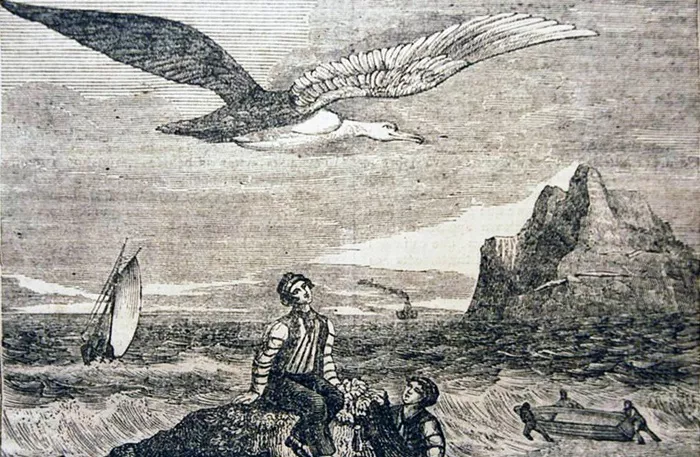Welcome to Poem of the Day – L’Albatros by Mikhail Charles Baudelaire.
Charles Baudelaire’s L’Albatros, featured in his landmark collection Les Fleurs du Mal (1857), is a compelling allegory of the poet‘s condition in society. Drawing inspiration from his own experiences and the broader Romantic tradition, Baudelaire crafts a vivid and poignant image of the albatross—a majestic bird rendered awkward and vulnerable when confined to the decks of a ship.
This essay explores L’Albatros as a profound meditation on isolation, the burden of genius, and the transcendence of art. We will examine its thematic depth, symbolic layers, and stylistic elegance, uncovering how Baudelaire transforms a simple maritime scene into a timeless metaphor for the human condition.
L’Albatros Poem
Souvent, pour s’amuser, les hommes d’équipage
Prennent des albatros, vastes oiseaux des mers,
Qui suivent, indolents compagnons de voyage,
Le navire glissant sur les gouffres amers.
A peine les ont-ils déposés sur les planches,
Que ces rois de l’azur, maladroits et honteux,
Laissent piteusement leurs grandes ailes blanches
Comme des avirons traîner à côté d’eux.
Ce voyageur ailé, comme il est gauche et veule !
Lui, naguère si beau, qu’il est comique et laid !
L’un agace son bec avec un brûle-gueule,
L’autre mime, en boitant, l’infirme qui volait !
Le Poète est semblable au prince des nuées
Qui hante la tempête et se rit de l’archer ;
Exilé sur le sol au milieu des huées,
Ses ailes de géant l’empêchent de marcher.
L’Albatros Poem Explanation
The Isolation of Genius
At its core, L’Albatros examines the isolation and alienation of the artist. The albatross, described as a “prince of the clouds,” represents the poet’s lofty ideals and unique perspective, unbound by the constraints of ordinary life. However, when brought down to earth, the bird becomes clumsy and awkward, a source of ridicule for the sailors.
This duality mirrors the poet’s plight: while his visionary talents elevate him above the mundane, they also render him vulnerable to misunderstanding and mockery. The image of the bird’s “giant wings” hindering its movement underscores the burden of genius—what enables the poet to soar in his art also makes him ill-suited to the ordinary world.
The Cruelty of Society
Baudelaire highlights the cruelty of society toward those who are different. The sailors, who “poke” and “mock” the albatross, embody a society that fails to appreciate or understand the poet’s gifts. Their laughter is not merely a reaction to the bird’s awkwardness but a reflection of their inability to comprehend its true nature.
This theme resonates beyond the poet’s personal experience, serving as a critique of a world that often marginalizes those who dare to deviate from the norm.
The Transcendence of Art
Despite its somber tone, L’Albatros also affirms the poet’s transcendence. While the bird’s majesty is diminished on the ship’s deck, it remains a “prince of the clouds” in its natural element. Similarly, the poet’s true power lies in his art, where he can rise above the limitations and cruelties of the earthly world.
This theme aligns with Baudelaire’s broader vision of poetry as a means of transcending the banal and achieving the sublime.
Structure and Style
A Balanced Form
L’Albatros consists of four quatrains, each written in alexandrines—twelve-syllable lines common in classical French poetry. The rhyme scheme, ABAB, lends the poem a musical quality, balancing its thematic weight with formal elegance.
The poem’s structure mirrors its central theme: the albatross’s majestic symmetry in flight juxtaposed with its awkwardness when grounded. This balance between form and content underscores Baudelaire’s mastery of his craft.
Vivid Imagery
Baudelaire’s imagery is both precise and evocative. The albatross, described as a “winged traveler” and a “prince of the clouds,” is imbued with an almost mythical grandeur. In contrast, the scenes on the ship—the bird’s awkward fall, the sailors’ mocking gestures—are rendered with stark realism.
This interplay between the sublime and the mundane enhances the poem’s emotional impact, making the bird’s fall all the more poignant.
Symbolism
The albatross serves as a powerful symbol of the poet, embodying both his lofty aspirations and his vulnerability. Its “giant wings,” while majestic in flight, become a hindrance on the ground, symbolizing the dual nature of artistic talent.
The sailors represent the uncomprehending masses, their cruelty reflecting society’s failure to value or understand the poet’s vision. The ship, meanwhile, can be seen as a microcosm of the world, a confined space where the poet’s grandeur is reduced to awkwardness.
Emotional Resonance
A Universal Struggle
While rooted in Baudelaire’s personal experience, L’Albatros speaks to a universal struggle: the tension between individual potential and societal expectations. The poem resonates with anyone who has felt out of place or misunderstood, offering a poignant reminder of the costs—and rewards—of staying true to one’s vision.
A Melancholy Elegance
The poem’s tone is both melancholic and defiant. Baudelaire acknowledges the hardships of the poet’s life, but he also affirms its unique beauty. This duality lends the poem a sense of bittersweet elegance, capturing the complexity of the artist’s existence.
Legacy
L’Albatros is a cornerstone of Baudelaire’s oeuvre and a defining work of modern poetry. Its themes of alienation, creativity, and resilience continue to resonate, inspiring generations of artists and readers.
The poem’s allegorical depth and formal precision exemplify Baudelaire’s belief in the transformative power of art. By turning the plight of a bird into a meditation on the human condition, L’Albatros transcends its immediate context, becoming a timeless reflection on the challenges and triumphs of the creative spirit.
Conclusion
L’Albatros is a masterpiece of poetic allegory, blending vivid imagery, rich symbolism, and profound insight into the human condition. Through the figure of the albatross, Baudelaire captures the paradox of the poet’s existence: both elevated and exiled, majestic and mocked.
In this poignant meditation on the artist’s place in society, Baudelaire affirms the power of art to rise above adversity. L’Albatros remains a testament to the enduring relevance of Baudelaire’s vision and the universal truths it illuminates.

